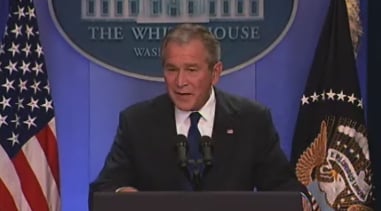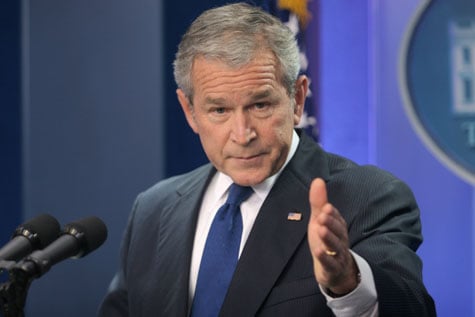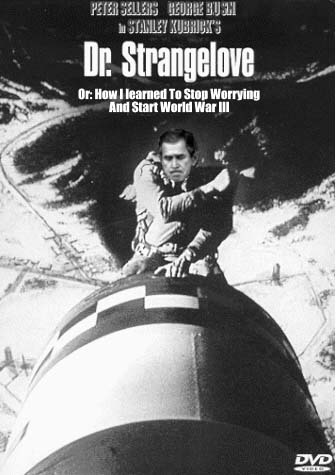Bush’s World War Three

” We got a leader in Iran who has announced that he wants to destroy Israel. So I’ve told people that if you’re interested in avoiding World War III, it seems like you ought to be interested in preventing them from have the knowledge necessary to make a nuclear weapon. I take the threat of Iran with a nuclear weapon very seriously….” (George W. Bush, 17 October 2007)
Grin and Laugh: “Here’s his expression while saying the words “World War Three” (Huffington Post, 17 October 2007)

“I believe that. I believe that [the revolt of passengers on the hijacked flight 93 on September 11, 2001] was the first counter-attack to World War III.” (George W. Bush, May 6, 2006)
“This notion that the United States is getting ready to attack Iran is simply ridiculous… Having said that, all options are on the table.” George W. Bush, February 2005)

We are not living in a sound and rational World, where far-reaching decisions by the US President are based on an understanding of their likely consequences.
A World War III is no longer a hypothetical scenario.
During the Cold War, the concept of “mutual assured destruction” (MAD) was put forth. An understanding of the devastating consequences of nuclear war largely contributed to avoiding the outbreak of war between the US and the Soviet Union.
Today, in the post-Cold war era, no such understanding prevails.
The specter of a nuclear holocaust, which haunted the world for half a century has been relegated to the status of “collateral damage”.
US foreign policy under the Neocons is based on a diabolical and criminal agenda. The “war on terrorism” is a lie; Iran does not constitute a threat to global security as confirmed by a recent IAEA report. Iran does not constitute a threat to Israel.
The US president is a liar, who believes his own lies.
While Iran’s non existent nukes are said to constitute a lethal and deadly threat, so-called tactical nuclear weapons “Made in America” are described in Pentagon documents as “harmless to the surrounding civilian population”.
In a bitter irony, those who decide on the use of nuclear weapons believe their own propaganda. A preemptive nuclear attack on Iran is upheld as a bona fide humanitarian undertaking which contributes to global security.
And now the US Head of State, who has a limited understanding of geopolitics, let alone geography, is hinting that if Iran does not give up its nonexistent nuclear weapons program, we might be reluctantly forced into in a World War III situation. Bush has insinuated that as Commander in Chief, he could decide to launch a war on Iran, which would result in World War III.
“Dr. Strangelove rides again.” In an utterly twisted logic, World War III is presented by the US President as a means to preventing collateral damage.
The war would be triggered by Iran, who has refused to abide by the “reasonable demands” of “the international community”.
Realities are twisted and turned upside down. Iran is being accused of wanting to start World War III.

Media Blackout
World public opinion has its eyes riveted on the cataclysm of “global warming”. World War III on the other hand is not front page news. We are talking about the loss of tens of thousands of lives: the consequences of the US military agenda which includes the preemptive use of nuclear weapons in a very concrete way threatens the future of humanity.
At present US and coalition forces including NATO and Israel are in an advanced state of readiness to launch an attack on Iran. Leaders of the coalition fully understand that such an action will result in a World War III scenario. Escalation scenarios have already been envisaged and analyzed by the Pentagon. US sponsored war games have even foreseen the possible intervention of Russia and China.
World War III has been on the lips of NeoCon architects of US foreign policy from the outset of the Bush regime. It is contained in a document published in September 2000 by the Project of the New American Century (PNAC),
The PNAC’s declared objectives imply a “long war”, a global war without borders::
“defend the American homeland;
fight and decisively win multiple, simultaneous major theater wars;
perform the “constabulary” duties associated with shaping the security environment in critical regions;
transform U.S. forces to exploit the “revolution in military affairs;”
Former Deputy Defense Secretary Paul Wolfowitz, former Defense Secretary Donald Rumsfeld and Vice President Dick Cheney had commissioned the PNAC blueprint prior to the 2000 presidential elections. The PNAC outlines a roadmap of conquest.
The pre-emptive nuclear doctrine contained in the Nuclear Posture Review is supported by the Republican Party and Washington’s conservative think-tanks
George W. Bush is an instrument of powerful economic interests. A preemptive war on Iran has widespread support by the US Congress, it is also supported by America’s European partners and allies. Leading Republicans have expressed their support for a preemptive World War III scenario. In a 2006 interview at the height of the Israeli bombing of Lebanon (July 16, 2007), former Republican leader of the House Newt Gingrich candidly acknowledged:
“We’re in the early stages of what I would describe as the third World War and, frankly, our bureaucracy’s not responding fast enough and we don’t have the right attitude. And this is the 58th year of the war to destroy Israel and, frankly, the Israelis have every right to insist that every single missile leave south Lebanon, and the United States ought to be helping the Lebanese government have the strength to eliminate Hezbollah as a military force — not as a political force in the parliament — but as a military force in south Lebanon.
The Bush Administration has adopted a first strike “pre-emptive” nuclear policy, which has now received congressional approval. Nuclear weapons are no longer a weapon of last resort as during the Cold War era.
In a classified Pentagon document (Nuclear Posture Review) presented to the US Senate in early 2002, the Bush Administration established so-called “contingency plans” for an offensive “first strike use” of nuclear weapons, not only against the “axis of evil” (Iraq, Iran, Libya, Syria and North Korea), but also against Russia and China.

Michel Chossudovsky is the author of the international bestseller America’s “War on Terrorism” Global Research, 2005. He is Professor of Economics at the University of Ottawa and Director of the Center for Research on Globalization.
To order Chossudovsky’s book America’s “War on Terrorism”, click here
Annex
Excerpts of President Bush’s October 17th White House Press Conference (emphasis added)
Q Mr. President, I’d like to follow on Mr. — on President Putin’s visit to Tehran. It’s not about the image of President Putin and President Ahmadinejad, but about the words that Vladimir Putin said there. He issued a stern warning against potential U.S. military action — U.S. military action against Tehran —
THE PRESIDENT: Did he say U.S.?
Q Yes.
THE PRESIDENT: Oh, he did?
Q He said — well, at least the quote said that — and he also said, “He sees no evidence to suggest Iran wants to build a nuclear bomb.” Were you disappointed with that message? And does that indicate possibly that international pressure is not as great as you once thought against Iran abandoning its nuclear program?
THE PRESIDENT: I — as I said, I look forward to — if those are, in fact, his comments, I look forward to having him clarify those, because when I visited with him, he understands that it’s in the world’s interest to make sure that Iran does not have the capacity to make a nuclear weapon. And that’s why, on — in the first round at the U.N., he joined us, and second round, we joined together to send a message. I mean, if he wasn’t concerned about it, Bret, then why did we have such good progress at the United Nations in round one and round two?
And so I will visit with him about it. I have not yet been briefed yet by Condi or Bob Gates about, you know, their visit with Vladimir Putin.
Q But you definitively believe Iran wants to build a nuclear weapon?
THE PRESIDENT: I think so long — until they suspend and/or make it clear that they — that their statements aren’t real, yeah, I believe they want to have the capacity, the knowledge, in order to make a nuclear weapon. And I know it’s in the world’s interest to prevent them from doing so. I believe that the Iranian — if Iran had a nuclear weapon, it would be a dangerous threat to world peace.
But this — we got a leader in Iran who has announced that he wants to destroy Israel. So I’ve told people that if you’re interested in avoiding World War III, it seems like you ought to be interested in preventing them from have the knowledge necessary to make a nuclear weapon. I take the threat of Iran with a nuclear weapon very seriously. And we’ll continue to work with all nations about the seriousness of this threat. Plus we’ll continue working the financial measures that we’re in the process of doing. In other words, I think — the whole strategy is, is that at some point in time, leaders or responsible folks inside of Iran may get tired of isolation and say, this isn’t worth it. And to me, it’s worth the effort to keep the pressure on this government.
And secondly, it’s important for the Iranian people to know we harbor no resentment to them. We’re disappointed in the Iranian government’s actions, as should they be. Inflation is way too high; isolation is causing economic pain. This is a country that has got a much better future, people have got a much better — should have better hope inside Iran than this current government is providing them.
So it’s — look, it’s a complex issue, no question about it. But my intent is to continue to rally the world to send a focused signal to the Iranian government that we will continue to work to isolate you, in the hopes that at some point in time, somebody else shows up and says it’s not worth the isolation.

